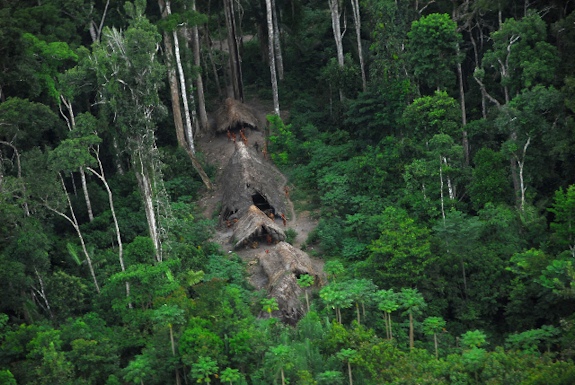August 9 is International Day of the World’s Indigenous People. With an indigenous uprising last month in Brazil, Survival International’s Joanna Eede celebrates the world’s first peoples in a new book.
 © Gleison Miranda/Funai
© Gleison Miranda/Funai
Each tribal society is unique. Many, however, have an ancient trust in the harmony between man and nature and the belief that for nature to endure, a long-term attitude to the caretaking of the Earth is fundamental. The Iroquois of North America always consider seven generations ahead in their decision-making—a philosophy echoed by Gana Bushman Roy Sesana, when he says, “We are not here for ourselves. We are here for our children and the children of our grandchildren.”
It is ironic that as ecosystems are destroyed, so the cultures with an understanding of them are also threatened.
Perfect conservationists they may not be, but as many tribal societies still depend today on their local environments for all their needs, they are perhaps more aware of the necessity for ecological balance than those who are removed from the natural elements that sustain life. They see that once the forests, trees, mountains, and oceans have been depleted, mutilated, or polluted too severely, no technological quick-fixes will restore them. To take more than is needed or to degrade the earth is not only self-defeating, but a neglect of their unborn children.
All tribal wisdom has been amassed orally. “Australia’s true history is never read,” wrote an Aboriginal poet, “but the black man keeps it in his head.” Of the world’s seven thousand languages, four thousand belong to indigenous peoples, yet linguists believe that a mother tongue is lost every two weeks. When a language dies, a unique perception of the world disappears, for indigenous languages are centuries-deep in insights concerning families, work, love, living, and dying. They are also languages of the land, suffused with vocabularies that contain complex geological, geographical, and climatic information that is both rooted in their locale, and universally significant.
 © Daniel Beltra
© Daniel Beltra
This wisdom may not be written down, posted to a blog, or studied in a school; it may be articulated through the media of myths and poetry rather than through scientific terminology. But that makes it no less valid. “I cannot read,” says Roy Sesana, “but I do know how to read the land and animals. All our children could. If they didn’t, they would have died long ago.”
It does not make sense to disregard the wisdom of those whose long-term approach to and knowledge of the natural world have been informed by experience over millennia.
It is ironic that as ecosystems are destroyed, so the cultures with an understanding of them are also threatened. Many areas that are the richest in biodiversity remain so due to the care of the people who live in them; the Jarawa inhabit the remaining tracts of virgin rainforest in the Andaman Islands. It surely stands to reason, therefore, that the best way to protect fragile ecosystems, as well as defending the rights of vulnerable peoples, is to secure the land rights of the indigenous communities.
It does not make sense to disregard the wisdom of those whose long-term approach to and knowledge of the natural world have been informed by experience over millennia, when we do not yet know the full scope of what it is we are losing. With traditionally low-carbon lifestyles, tribal people are well placed to give advice on the solutions needed to mitigate climate change. They believe they can influence the choices which humanity faces. “Only we, the indigenous people, know how to protect the forest,” says Davi Kopenawa Yanomami, “give us back our lands before the forest dies.”
 © Bruno Morandi
© Bruno Morandi
A thousand years ago the Iroquois’ Peacemaker is said to have gathered warring Native Americans together, and placed in their hands the protection of all life forms. He was asked for how long this responsibility would last. “That’s up to you,” he replied.
Joanna Eede is an editor at Survival International.
